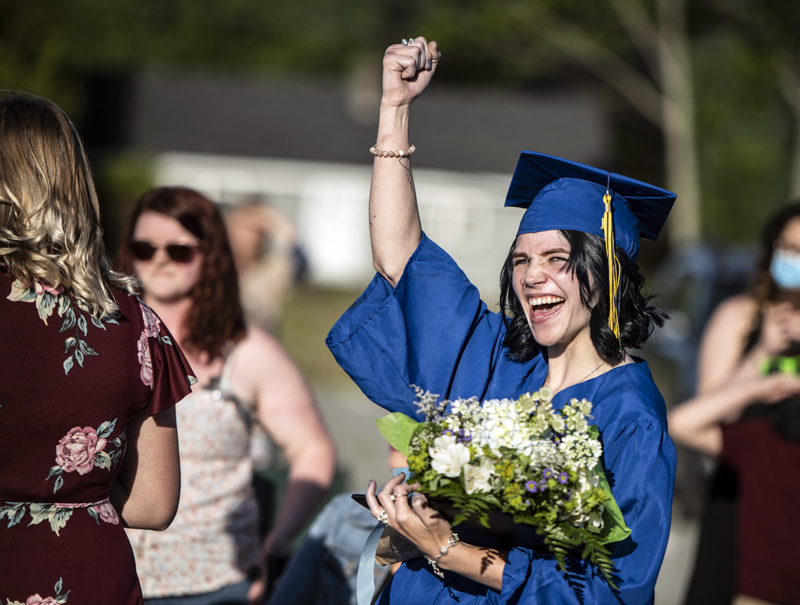
Brooke Fillmore pumps her fist in celebration after the RSU 40 Adult Education graduation ceremony at Medomak Valley High School in Waldoboro on Thursday, June 10. (Bisi Cameron Yee photo)
“It’s not how you graduate — it’s that you graduate,” RSU 40 Adult Education Director Kayla Sikora said to the seven students on hand to receive their diplomas at Medomak Valley High School in Waldoboro. Four other students graduated but were not present at the ceremony.
MVHS Principal Linda Pease, RSU 40 Superintendent Steve Nolan, and the RSU 40 curriculum committee were on hand to honor the graduates.
School Resource Officer William Labombarde gave the keynote speech. “You’ve reinvented yourselves; you came here and you succeeded,” Labombarde said to the assembled students.
Labombarde shared three simple rules with the students he tutored throughout their time in the program. “Do something; don’t be afraid to do something else; hold your breath, close your eyes and jump in with both feet,” he said.
Adriana Shultz-Luce and Brooke Fillmore spoke on behalf of their classmates. Both students had not been able to follow the traditional path to a diploma. “You can be different and you can still kick butt,” Fillmore said.
The adult education program prepares students for the HiSET exam, a replacement for the GED. According to the RSU 40 Adult Education website, all high school equivalency diploma programs, college and career advising, and college prep classes are free to Maine residents.
The HiSET was created by educators and tested on college students and unlike the GED, the HiSET offers students two free retests to achieve the scores necessary to graduate. Sikora said the Hi-SET has an online presence and all the students utilized it to various degrees, studying from home or taking practice tests before passing the test to earn their diplomas.
In a phone call prior to the graduation, Sikora said the program has had increased enrollment in part due to COVID-19. She said students who have been stressed by the pandemic have found it easier to attend adult education classes either in person or remotely.
The one-on-one attention and more individualized learning plans particularly helped students who were having difficulty adapting to changes necessitated by the COVID-19 pandemic in the school years. The program currently has 18 students, include a few students who are fully remote.
“Students choose this path for different reasons,” Sikora said, from difficulty meeting grade requirements or attendance requirements to situations in their background or home life that make adult education a better choice for them. “There are many different circumstances that prevent students from pursuing traditional schooling.”
Sikora said that bullied students, transgender students, and students with social anxiety are among those who may not be comfortable in a traditional school environment. For those with anxiety for example, a smaller class size is better, she said.
In her doctoral dissertation Sikora explored changing perceptions of adult education. She sees fewer students returning to school later in life to attain their diplomas. All but one of her current students is in the 16-20 age range.
Sikora said the past year saw less participation in enrichment classes.
“There has been a steep decline this year due to the pandemic. Enrichment courses mostly serve the older population, and even if they are offered online there can be a learning curve,” she said.
Looking forward, “I think we’re going to get more referrals due to COVID-19,” Sikora said. Students in middle school now will have lasting effects from the impact of COVID-19 on their education. “I’m sure there will be residual effects,” she said.
Sikora said a recent merge of RSU 40 with RSU 12 will bring significant improvements. The current program teaches reading, writing, math, science and social studies, but has only had certified teachers for English and math. The rest of the curriculum has been taught with modules from a learning management system, an approach that Sikora said was “not ideal.”
The Midcoast Adult and Community Education program, as it will be known starting July 1, will have teachers for all five subjects.
Sikora said she has received a lot of support from the district and from MVHS for her students. When she started in 2017 she said the program was more focused on being an enrichment adult education program, teaching basket weaving or calligraphy. “The academic piece was missing,” Sikora said.
“It was important to me to reach students who need a different pathway. Enrichment was all there was when I first started. Now it’s only 30% of programming,” Sikora said.
At the end of the ceremony seven students shifted the positions of their tassels to signify their achievement. Graduate Charles Dorian took the stage for an impromptu expression of gratitude toward the people who helped them get there including Sikora, Labombarde, and adult education teachers Zachary Melvin and Wilhelmina Ulbrich
In her earlier speech Fillmore also touched on the importance of the adult education administrators and instructors.
“They worked miracles for me,” she said.






